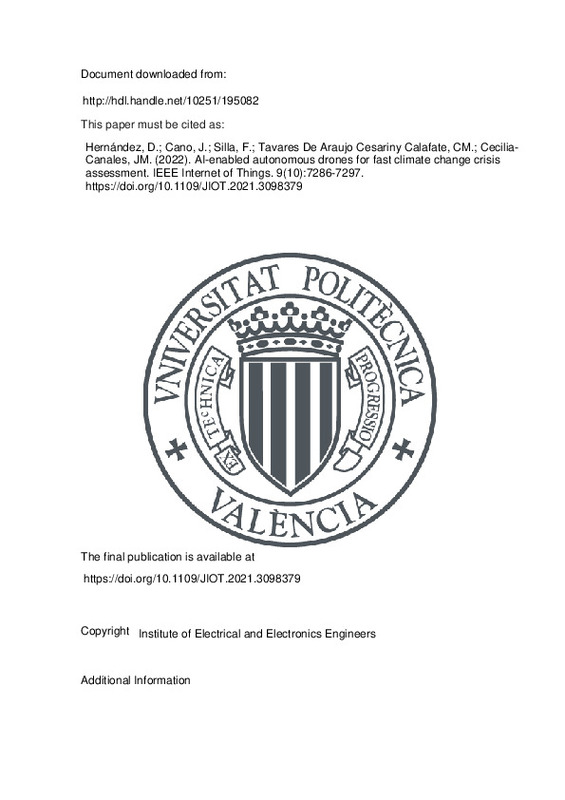Hernández, D.; Cano, J.; Silla, F.; Tavares De Araujo Cesariny Calafate, CM.; Cecilia-Canales, JM. (2022). AI-enabled autonomous drones for fast climate change crisis assessment. IEEE Internet of Things. 9(10):7286-7297. https://doi.org/10.1109/JIOT.2021.3098379
Por favor, use este identificador para citar o enlazar este ítem: http://hdl.handle.net/10251/195082
|
Título:
|
AI-enabled autonomous drones for fast climate change crisis assessment
|
|
Autor:
|
Hernández, Daniel

 Cano, Juan-Carlos
Cano, Juan-Carlos

 Silla, Federico
Silla, Federico

 Tavares De Araujo Cesariny Calafate, Carlos Miguel
Tavares De Araujo Cesariny Calafate, Carlos Miguel

 Cecilia-Canales, José María
Cecilia-Canales, José María
|
|
Entidad UPV:
|
Universitat Politècnica de València. Departamento de Informática de Sistemas y Computadores - Departament d'Informàtica de Sistemes i Computadors
Universitat Politècnica de València. Escola Tècnica Superior d'Enginyeria Informàtica
|
|
Fecha difusión:
|
|
|
Resumen:
|
[EN] Climate change is one of the greatest challenges for modern societies. Its consequences, often associated with extreme events, have dramatic results worldwide. New synergies between different disciplines, including ...[+]
[EN] Climate change is one of the greatest challenges for modern societies. Its consequences, often associated with extreme events, have dramatic results worldwide. New synergies between different disciplines, including artificial intelligence (AI), Internet of Things (IoT), and edge computing can lead to radically new approaches for the real-time tracking of natural disasters that are also designed to reduce the environmental footprint. In this article, we propose an AI-based pipeline for processing natural disaster images taken from drones. The purpose of this pipeline is to reduce the number of images to be processed by the first responders of the natural disaster. It consists of three main stages: 1) a lightweight autoencoder based on deep learning; 2) a dimensionality reduction using the t-distributed stochastic neighbor embedding algorithm; and 3) a fuzzy clustering procedure. This pipeline is evaluated on several edge computing platforms with low-power accelerators to assess the design of intelligent autonomous drones to provide this service in real time. Our experimental evaluation focuses on flooding, showing that the amount of information to be processed is substantially reduced, whereas edge computing platforms with low-power graphics accelerators are placed as a compelling alternative for processing these heavy computational workloads, obtaining a performance loss of only 2.3 x compared to its cloud counterpart version, running both the training and inference steps.
[-]
|
|
Palabras clave:
|
Internet of Things
,
Clustering algorithms
,
Cloud computing
,
Edge computing
,
Pipelines
,
Performance evaluation
,
Drones
,
Climate Change
,
UAVs
,
Deep Learning
,
Artificial Vision
,
Sustainable ICT
|
|
Derechos de uso:
|
Reserva de todos los derechos
|
|
Fuente:
|
IEEE Internet of Things. (eissn:
2327-4662
)
|
|
DOI:
|
10.1109/JIOT.2021.3098379
|
|
Editorial:
|
Institute of Electrical and Electronics Engineers
|
|
Versión del editor:
|
https://doi.org/10.1109/JIOT.2021.3098379
|
|
Código del Proyecto:
|
info:eu-repo/grantAgreement/AGENCIA ESTATAL DE INVESTIGACION//RTC2019-007159-5//DESARROLLO DE INFRAESTRUCTURAS IOT DE ALTAS PRESTACIONES CONTRA EL CAMBIO CLIMÁTICO BASADAS EN INTELIGENCIA ARTIFICIAL/
info:eu-repo/grantAgreement/AEI/Plan Estatal de Investigación Científica y Técnica y de Innovación 2017-2020/RTI2018-096384-B-I00/ES/SOLUCIONES PARA UNA GESTION EFICIENTE DEL TRAFICO VEHICULAR BASADAS EN SISTEMAS Y SERVICIOS EN RED/
info:eu-repo/grantAgreement/f SéNeCa//20813%2FPI%2F18/
info:eu-repo/grantAgreement/MICINN//RYC2018-025580-I/
info:eu-repo/grantAgreement/Conselleria d'Educació, Investigació, Cultura i Esport de la Generalitat Valenciana//AICO%2F2020%2F302/
|
|
Agradecimientos:
|
This work was supported in part by the Spanish Ministry of Science and Innovation under Grant RYC2018-025580-I, Grant RTI2018-096384-B-I00, and Grant RTC2019-007159-5; in part by the Fundacien Seneca under Project 20813/PI/18; ...[+]
This work was supported in part by the Spanish Ministry of Science and Innovation under Grant RYC2018-025580-I, Grant RTI2018-096384-B-I00, and Grant RTC2019-007159-5; in part by the Fundacien Seneca under Project 20813/PI/18; and in part by the "Conselleria de Educacion, Investigacion, Cultura y Deporte, Direccio General de Ciencia i Investigacio, Proyectos" under Grant AICO/2020/302.
[-]
|
|
Tipo:
|
Artículo
|







![[Cerrado]](/themes/UPV/images/candado.png)


